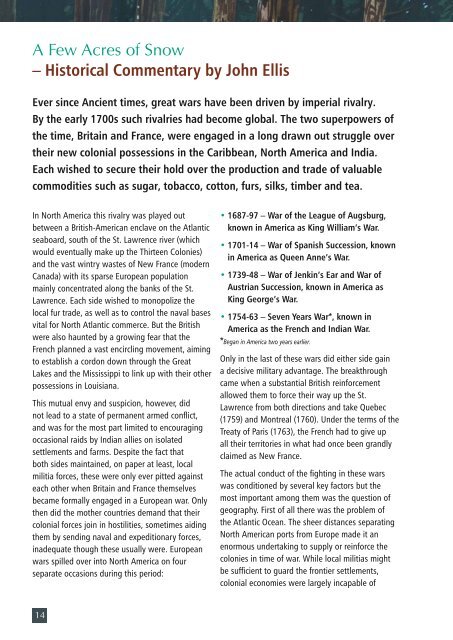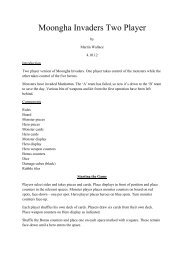A Few Acres Of Snow â 2nd Edition Rules (PDF) - Treefrog Games
A Few Acres Of Snow â 2nd Edition Rules (PDF) - Treefrog Games
A Few Acres Of Snow â 2nd Edition Rules (PDF) - Treefrog Games
Create successful ePaper yourself
Turn your PDF publications into a flip-book with our unique Google optimized e-Paper software.
A <strong>Few</strong> <strong>Acres</strong> of <strong>Snow</strong><br />
– Historical Commentary by John Ellis<br />
Ever since Ancient times, great wars have been driven by imperial rivalry.<br />
By the early 1700s such rivalries had become global. The two superpowers of<br />
the time, Britain and France, were engaged in a long drawn out struggle over<br />
their new colonial possessions in the Caribbean, North America and India.<br />
Each wished to secure their hold over the production and trade of valuable<br />
commodities such as sugar, tobacco, cotton, furs, silks, timber and tea.<br />
In North America this rivalry was played out<br />
between a British-American enclave on the Atlantic<br />
seaboard, south of the St. Lawrence river (which<br />
would eventually make up the Thirteen Colonies)<br />
and the vast wintry wastes of New France (modern<br />
Canada) with its sparse European population<br />
mainly concentrated along the banks of the St.<br />
Lawrence. Each side wished to monopolize the<br />
local fur trade, as well as to control the naval bases<br />
vital for North Atlantic commerce. But the British<br />
were also haunted by a growing fear that the<br />
French planned a vast encircling movement, aiming<br />
to establish a cordon down through the Great<br />
Lakes and the Mississippi to link up with their other<br />
possessions in Louisiana.<br />
This mutual envy and suspicion, however, did<br />
not lead to a state of permanent armed conflict,<br />
and was for the most part limited to encouraging<br />
occasional raids by Indian allies on isolated<br />
settlements and farms. Despite the fact that<br />
both sides maintained, on paper at least, local<br />
militia forces, these were only ever pitted against<br />
each other when Britain and France themselves<br />
became formally engaged in a European war. Only<br />
then did the mother countries demand that their<br />
colonial forces join in hostilities, sometimes aiding<br />
them by sending naval and expeditionary forces,<br />
inadequate though these usually were. European<br />
wars spilled over into North America on four<br />
separate occasions during this period:<br />
• 1687-97 – War of the League of Augsburg,<br />
known in America as King William’s War.<br />
• 1701-14 – War of Spanish Succession, known<br />
in America as Queen Anne’s War.<br />
• 1739-48 – War of Jenkin’s Ear and War of<br />
Austrian Succession, known in America as<br />
King George’s War.<br />
• 1754-63 – Seven Years War*, known in<br />
America as the French and Indian War.<br />
*Began in America two years earlier.<br />
Only in the last of these wars did either side gain<br />
a decisive military advantage. The breakthrough<br />
came when a substantial British reinforcement<br />
allowed them to force their way up the St.<br />
Lawrence from both directions and take Quebec<br />
(1759) and Montreal (1760). Under the terms of the<br />
Treaty of Paris (1763), the French had to give up<br />
all their territories in what had once been grandly<br />
claimed as New France.<br />
The actual conduct of the fighting in these wars<br />
was conditioned by several key factors but the<br />
most important among them was the question of<br />
geography. First of all there was the problem of<br />
the Atlantic Ocean. The sheer distances separating<br />
North American ports from Europe made it an<br />
enormous undertaking to supply or reinforce the<br />
colonies in time of war. While local militias might<br />
be sufficient to guard the frontier settlements,<br />
colonial economies were largely incapable of<br />
14











